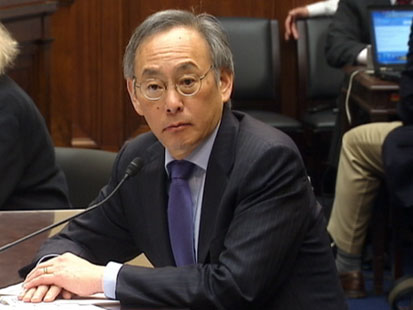Sec. Chu Gives Energy Dept. an "A" on Gas Prices

ABC News
WASHINGTON, D.C. - Energy Secretary Steven Chu told a House committee this morning that his agency deserved at least an "A" grade for its handling of gas prices and fuel standards.
Testifying before the House Committee on Oversight and Government Reform, Chu was asked to grade the department's role in regulating the costs at the pump. At a seperate hearing earlier this month, the secretary rated himself as an "A-minus" in his overall performance. Today chairman Rep. Darrell Issa, R-Ca., asked if he should receive the same mark on fuel policies.
"The tools we have at our disposal are limited, but I would say I would give myself a little higher in that since I became secretary of energy, I've been doing everything I can to get long-term solutions," Chu said.
Maintaining that oil prices were largely out of the agency's control, the secretary said increased domestic production and new markets in alternative energies had kept domestic prices down.
Chu pointed to international factors as the driving influence behind prices, including uncertainty in the Middle East and demand in emerging economies including China and India.
"The demand in the United States is quite moderate. In fact, it's essentially flat, which is good news especially as we increase our oil production."
Republicans present for the testimony balked at the claim, with some suggesting the Obama administration had been disingenuous for counting increased oil production as an accomplishment when actual drilling on public land had retracted. Chairman Issa said even the growth in private development had been in spite of the president's policies.
"You can't take credit for that which you are deterring just because you're being overcome by the private sector working around it."
It is a theme commonly espoused by the party regarding positive economic trends.
Stimulus funds from the American Recovery Act in alternative fuels also came under fire, with Republicans saying the investments had produced little results. Rep Patrick McHenry was particularly frustrated with funding in Ford and Nissan's electric and hybrid divisions.
"To tell my constituents, with 10 percent unemployment, Western North Carolina, that you need to buy a Nissan Leaf? That in order to commute for 50 minutes a day you're going to have to have an employer who is wonderful enough to provide you a place to plug in your car, so you can get home? It's absolutely ridiculous."
Chu acknowledged the high cost of hybrid and electric vehicles, but said aggressive research in battery technology would introduce a "$20,000 car that can pay for itself in five years."
Democrats on the committee said backlash over administration programs were purely political. After noting that in 2010 domestic oil imports had dropped below 50 percent for the first time in over a decade, ranking member Rep. Elijah Cummings, D-Md., urged the body to think outside short-term party gains.
"We have to be responsible about our oversight," he said. "We cannot simply attack any program that has the words 'Obama' and 'clean air' attached to them."